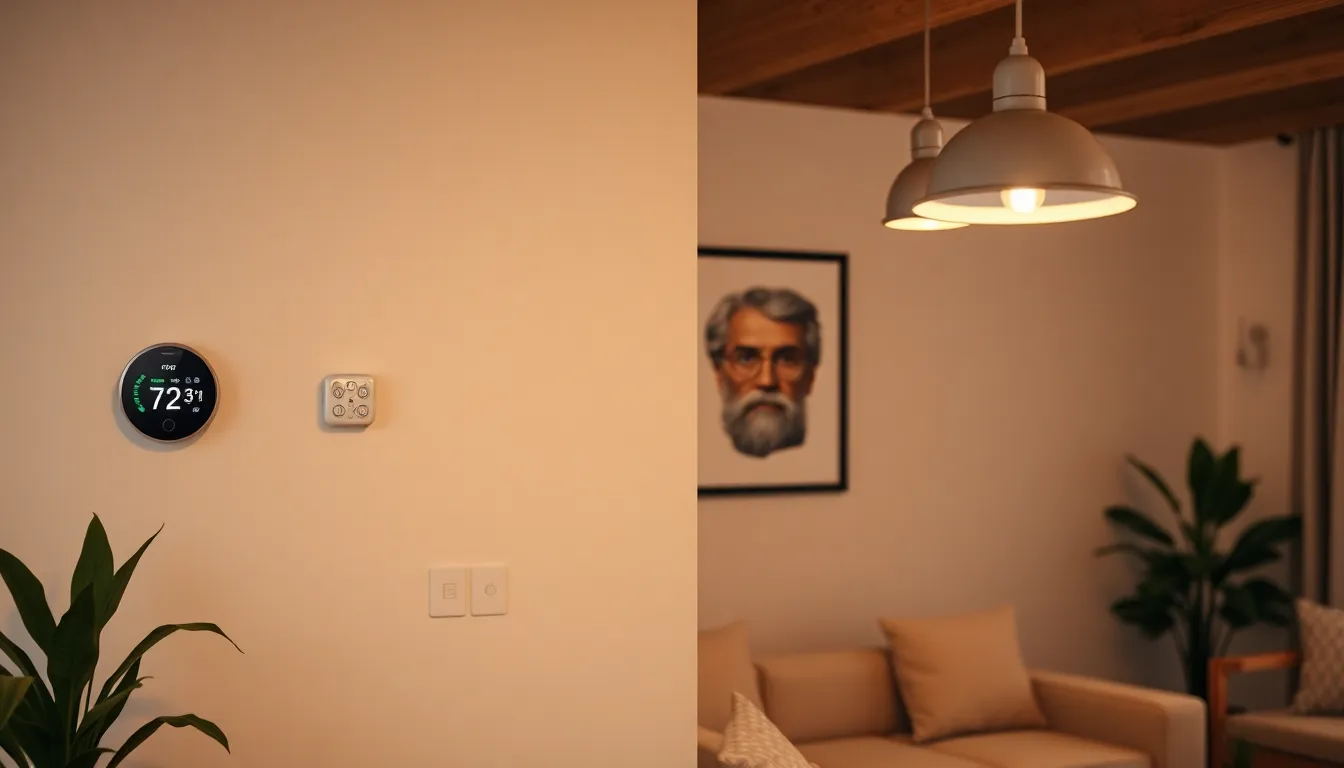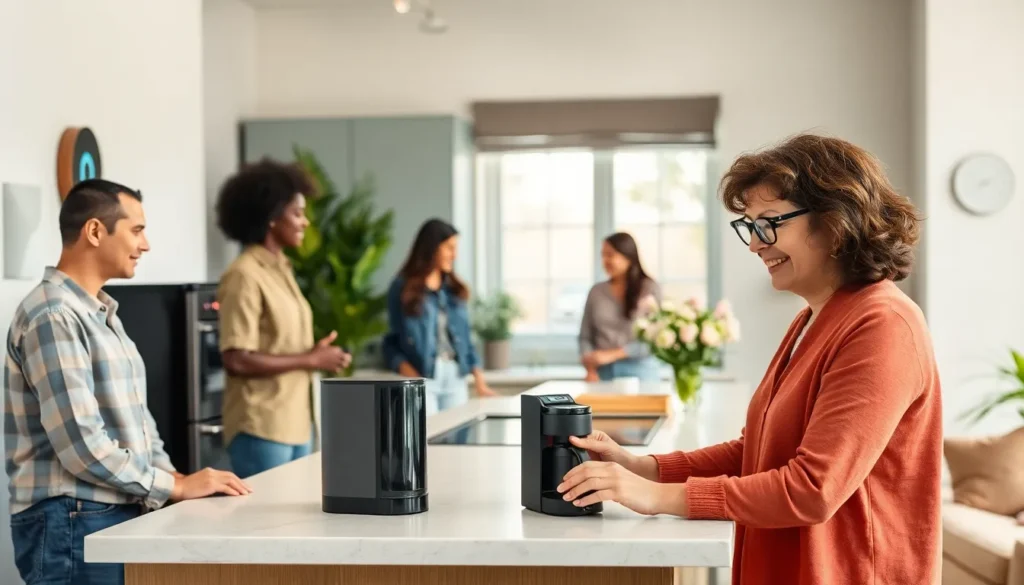In a world where even your toaster can have a social media presence, smart tech solutions are no longer just a novelty—they’re a necessity. Imagine a life where your coffee brews itself while you snooze the alarm for the fifth time. With the right gadgets, that dream can be your reality.
Smart technology is revolutionizing homes and workplaces alike, making everyday tasks easier and more efficient. From voice-activated assistants to intelligent lighting systems, these innovations aren’t just cool—they’re downright life-changing. So why not embrace the future and let smart tech take the wheel? After all, who wouldn’t want to spend less time fumbling with gadgets and more time enjoying life? Dive in and discover how smart tech can transform your daily routine into a seamless, stress-free experience.
Table of Contents
ToggleOverview of Smart Tech Solutions
Smart tech solutions encompass a broad range of devices designed to enhance daily living. These solutions streamline tasks whether in homes or workplaces. They integrate connectivity and automation, providing convenience and efficiency.
Smart home devices include smart thermostats, lighting systems, and security cameras. Smart thermostats learn user habits and adjust temperature settings for optimal comfort and energy savings. Smart lighting systems allow remote control of brightness and color, creating customizable environments.
Businesses utilize smart technology to improve operational efficiency. Smart sensors monitor equipment health, reducing downtime and ensuring better performance. Smart software solutions help manage data analytics, enabling informed decision-making.
Wearable technology has gained traction, offering health tracking features like heart rate monitoring and sleep analysis. Smartwatches and fitness trackers encourage users to maintain healthy lifestyles through real-time feedback.
Connected appliances, such as smart refrigerators and ovens, also exemplify smart tech solutions. These appliances can alert users about inventory and facilitate meal planning. Smart coffee makers program themselves to brew coffee at designated times, simplifying morning routines.
Incorporating smart technology in everyday life supports productivity and ease. Organizations benefit from the increased efficiency that these innovations bring, while consumers enjoy improved quality of life. Individuals who embrace smart tech find a more organized and enjoyable living experience.
Continuous advancements in technology promise further enhancements in smart solutions, making life even easier. As awareness of these tools grows, integration into daily routines becomes more seamless. Adopting smart tech solutions leads to a future characterized by adaptability and innovation.
Benefits of Smart Tech Solutions

Smart tech solutions offer numerous advantages that enhance everyday living and operational efficiency. These technologies streamline daily tasks and create financial savings.
Improved Efficiency
Smart technology increases operational efficiency in both homes and businesses. Devices like smart thermostats automatically adjust temperatures, reducing energy waste. Security cameras provide real-time monitoring. This feature allows users to quickly address potential threats. Automated lighting systems enable remote control, ensuring lights turn off when not in use. Additionally, data analytics software helps businesses identify trends and optimize workflows. Deploying smart sensors can enhance inventory management by tracking stock levels in real time. Adopting these solutions leads to significant time savings and improved productivity.
Cost Savings
Cost savings represent another critical benefit of smart tech solutions. Smart appliances reduce energy consumption; for instance, washing machines that operate only during off-peak hours lead to lower utility bills. Monitoring devices track energy usage, giving users insights into consumption patterns. They can make adjustments to become more efficient. Insurance companies often provide discounts for homes equipped with smart security features, as they reduce the risk of theft. Businesses that utilize smart technology can lower operational costs through improved efficiency and waste reduction. Embracing these innovations leads to substantial long-term financial savings.
Types of Smart Tech Solutions
Smart tech solutions encompass various innovations designed to enhance daily living and streamline tasks. These solutions fall under different categories.
Home Automation
Home automation systems integrate devices that manage tasks automatically. Smart thermostats regulate temperature based on user habits, optimizing energy consumption. Automated lighting systems respond to motion and adjust brightness based on ambient light. Security cameras enable remote monitoring for improved safety and peace of mind. Smart locks provide keyless entry, adding convenience and security. These innovations lead to increased efficiency in managing households while reducing energy costs.
Wearable Technology
Wearable technology focuses on personal health and activity tracking. Smartwatches offer real-time notifications, activity tracking, and heart rate monitoring. Fitness trackers encourage users to meet fitness goals by logging steps and calories burned. These devices can monitor sleep patterns, providing insights into overall health. Many wearables connect to smartphones for enhanced functionality, allowing seamless access to data. The information gathered can motivate healthier lifestyle choices and foster greater self-awareness.
Smart Healthcare Devices
Smart healthcare devices revolutionize patient care and monitoring. Devices like blood glucose monitors track vital health metrics, offering real-time insights for users managing chronic conditions. Smart pill dispensers remind patients to take medications on time, preventing missed doses. Telehealth solutions enable remote consultations, increasing access to healthcare for varying populations. These technologies enhance patient engagement and improve health outcomes by providing accessible and timely information. Utilizing these devices can lead to better management of health conditions.
Challenges in Implementing Smart Tech Solutions
Implementing smart tech solutions presents several challenges that organizations and consumers face in navigating this growing landscape.
Privacy Concerns
Privacy concerns rank among the major challenges in adopting smart technology. Many smart devices collect vast amounts of personal data, leaving individuals worried about how this information is used and stored. Consumers often express anxiety over surveillance, fearing unauthorized access to their data. Compliance with data protection regulations, like GDPR, becomes essential for companies deploying these technologies. Potential breaches can lead to significant reputational damage and legal consequences. Organizations must prioritize transparency, ensuring users understand data usage and offering robust security measures to safeguard personal information.
Technical Issues
Technical issues frequently hinder the effective deployment of smart tech solutions. Compatibility problems often arise when integrating diverse devices and platforms. Users may experience connectivity issues, disrupting functionality and negatively impacting user experience. Regular software updates and maintenance become crucial to avoid performance degradation. Additionally, many businesses lack sufficient IT infrastructure to support these advanced technologies. Employees need training to understand how to use smart devices effectively. Addressing these technical challenges increases the likelihood of successful implementation and maximizes the benefits smart technology offers.
Future Trends in Smart Tech Solutions
Smart technology continues to evolve, shaping how individuals and organizations interact with their environments. Two major trends stand out: integration with AI and sustainability efforts.
Integration with AI
Artificial intelligence enhances the capabilities of smart tech solutions. Smart devices learn user preferences and adjust automatically, increasing convenience. Voice-activated assistants become more intuitive, handling complex tasks with ease. Machine learning algorithms analyze data, predicting and optimizing behaviors to improve user experience effectively. Both home automation and wearable technologies benefit from AI’s predictive capabilities, resulting in a more streamlined lifestyle. Smart healthcare devices also utilize AI for diagnostics and patient monitoring, significantly improving health outcomes.
Sustainability Efforts
Sustainability drives the development of smart tech solutions as industries focus on eco-friendly practices. Smart devices minimize energy consumption by optimizing usage patterns, offering significant reductions in utility costs. Energy-efficient systems like smart thermostats promote intelligent climate control, reducing waste without sacrificing comfort. Additionally, these solutions contribute to smart grid technologies that support renewable energy sources. Companies increasingly prioritize sustainable production methods to minimize their environmental footprint. Innovations in smart packaging and waste management further ensure efficient resource utilization, paving the way for a greener future.
Embracing smart tech solutions can transform everyday life by enhancing convenience and efficiency. As these technologies continue to evolve they promise a future where daily tasks become effortlessly automated. The integration of AI and sustainability into smart devices not only improves user experience but also contributes to a greener planet.
While challenges like privacy concerns and technical issues exist addressing these obstacles is vital for unlocking the full potential of smart technology. With the right approach organizations and consumers can harness the benefits of smart solutions leading to improved productivity and a more enjoyable lifestyle. The journey toward a smarter future is just beginning and the possibilities are endless.






